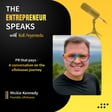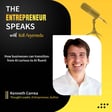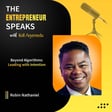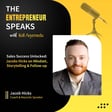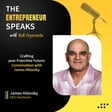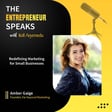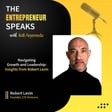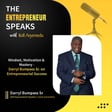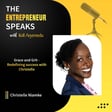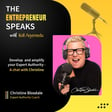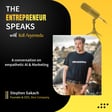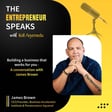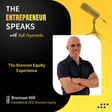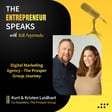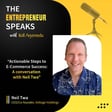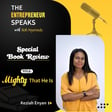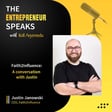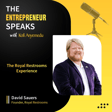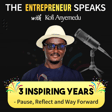Become a Creator today!Start creating today - Share your story with the world!
Start for free
00:00:00
00:00:01

Earthyria -Skincare from Nature
In this episode, we dive into the radiant world of skincare and self -care . Listen as Nuong Faalong. founder of Earthyria share her entrepreneurial journey in growing her company.
Don't forget to like and subscribe.
Enjoy !
#theentrepreneurspeakspodcast
Transcript
Mindful Skincare Practices
00:00:00
Speaker
want to encourage consumers of skin care products, be mindful of what you use on your skin. And your skin is going to take you your whole life. And whatever you're doing to it now, the practices will show as you get older. I wish I had started skin care earlier in life, but it's never too late to re-evaluate what you're using on your skin and to take better care of your skin, to be mindful of your skin.
00:00:29
Speaker
I usually say that I have a small mantra, what can go in your mouth doesn't belong on your skin. So if you look at it and it's poisonous for your mouth, then it's poisonous for your skin also. So prioritize skin care and prioritize sustainable skin care because eventually that's what's good for us and good for our environment.
Podcast & Guest Introduction
00:00:50
Speaker
Welcome to the Entrepreneur Speaks podcast where I sit down with successful entrepreneurs and hear their stories from their biggest failures to their greatest successes. You get a behind the scenes look at what it really takes to make it as an entrepreneur. So come along for the ride and let's explore the entrepreneurial journey together. Welcome dear listeners to another episode of the Entrepreneur Speaks podcast.
00:01:18
Speaker
Today, we have the pleasure of diving into the radiant world of skincare and self-care. I'm thrilled to introduce my guest, Rong Falong, the entrepreneur behind Etheria. Welcome to my show, Rong. Thank you so much, Kofi. Good evening. Thank you for inviting me and good evening to your listeners also. All right. All
Misconceptions & Market Shifts in Skincare
00:01:42
Speaker
right. So let's start off by you telling us a bit more about yourself and your company Etheria.
00:01:47
Speaker
Okay. You know, I always get stuck when someone tells me to talk about myself. Yes. So I'm just a girl, maybe a woman.
00:02:04
Speaker
You know, as you grow up, for a lot of black women, as you're growing, you become more and more particular about your skin. I wish I had started earlier. Because now I have customers who are like 13 years old and I'm like, oh.
00:02:26
Speaker
You start to realize that you want to take better care of your skin and some years ago in Ghana among black women when you start talking about skin care
00:02:38
Speaker
then everyone's already thinking about, you know, lightening your skin, bleaching your skin, skin toning, all of that. I mean, skincare immediately evokes skin lightening. I mean, that's when people feel like, okay, you're taking care of your skin. You know?
00:02:55
Speaker
Those kind of things. So I started paying more attention to my skin. And then I realized that I couldn't... Most of the products that were available to me were skin-lightening products. And so I started looking for better. I started looking for something that would not lighten my skin, but take care of my skin, nourish my skin, you know. I wanted healthy skin.
Skill Enhancement During COVID
00:03:26
Speaker
And that was quite challenging. And around that time too, there was also this influx of organic skincare, yada, yada, yada. But all of them also started pandering to the whole bleaching market. So what I started doing was I would be mixing some more small things. I would mix different oils because, you know, I like this oil, but I want more. Then I'll mix it with this one. Like, why can't I have this? You know, so I keep mixing for myself.
00:03:57
Speaker
So fast forward to COVID lockdown. When I was locked down in the US. And I couldn't make my way out for like five months. And I used the time to polish up. I remember reading about a number of things we were posting. I was constantly ranting because I just wanted to go. I just wanted to go.
00:04:23
Speaker
Yeah. So anyway, so COVID lockdown came, I was locked down in the U.S. and then I started learning more. There were things I initially couldn't do, like initially I used to find, I used to do lotions and butters and all that, but I found soap making so difficult. So that was also a good time to learn soap making because I was just idle. I wasn't working, I was home.
00:04:48
Speaker
So I did a lot of improvements upon the skills that I already had in skin care. And then after lockdown, I started venturing into making it commercial. Initially, when I make it, my friends come and take it.
Brand Development: Etheria
00:05:06
Speaker
So at a point I told them, if I sell this to you, will you buy? Because I'm spending money making these products and then they just come and take it away for free.
00:05:16
Speaker
So I remember the first soap I sold was 20 cities. I said, would they buy this? They said, yes, they would buy it. I was still skeptical. But even then my friends used to say, oh, very soon I'll be selling skincare products. I said, no, no, no, it's not my mind. I'm not thinking about this. But they were buying and I was making. And I said, let me just formalize this. So I formalized it. And then I started selling skincare products.
00:05:47
Speaker
That's the summary of it, of my business. Yeah, it's a very good summary. Now let's talk about the name. The name, where from the name? Etherea. Etherea. Yeah, what's the story behind it?
00:06:01
Speaker
So I wanted a name that nobody has. I wanted a name that, I mean, most of our products are, it's a share-based business. So most of the products are based with, I made with share-batter. But I don't want to call it, I thought of a few names, share this, share that, beauty this, beauty that, but those are so generic.
00:06:25
Speaker
And you'll find those names everywhere. Sometimes you might even be able to register it in Ghana, but you realize that someone also has it in California or Nigeria. It's like the same thing. So I said, let me find a unique name. And I wanted a name that it encapsulates what you are doing so well that
00:06:46
Speaker
You don't need a tagline, but cap, whatever, just some one line. You know, like Revlon and all those people have. Yeah. So I said, OK, I thought about something earthy. Initially, I thought, FK, something like that. And I'm like, oh, this is so regular.
00:07:05
Speaker
But I wanted it to signify natural products and still be unique. So I started thinking, let me find derivatives of the word earth. So this is our earth. We are making the products. They are earth-based products. They are earth-inspired. They are plant-based. So I thought, okay, it has to be earthy.
00:07:31
Speaker
to give people that natural feel. And so I came up with Etsy.
00:07:40
Speaker
But I think I said company name was just, it didn't sound so amazing. So I started thinking of, you know, what do I call permutations of it? So I thought, you know, I came up with, you know, different, different types. And then I got the, added the RIA to it. Okay, the RIA sounds a little futuristic. So appeal also to the younger crowd. So let me just,
00:08:06
Speaker
you know go with a theory and then i searched all around and i realize that it is actually a word no one has come up with it doesn't exist at all like this. This is our name you know this is the word for it and i also realize i mean it implies something natural when you look at the first thing you see is s.
00:08:27
Speaker
It's able to capture the natural idea, the organic idea. It's able to capture the holistic qualities because it's full, the full earth. And
Challenges in Entrepreneurship
00:08:41
Speaker
it's still able to evoke a sense of universality, to give us a global reach because that's the aim eventually.
00:08:53
Speaker
And I also felt that would definitely, sometimes I'm supposed to say they can't pronounce it, but imagine if you look at it and you're like, hmm, that'll make you remember the name, right? And so that's how we came up with Etherea. But then the first brand we introduced on Etherea was Beauty 101.
00:09:15
Speaker
Which is still a brand under ethevia and When we introduced beauty 101 we introduced lotions butter soaps and the beauty 101 So a lot of the name got so popular a lot of people think that our name is beauty 101, but that's just a brand name
00:09:36
Speaker
Okay, I like the story behind the name. So you've given us a genesis of your company, Etheria. I know you as a generalist, so what really inspired you to embark on this entrepreneur?
00:09:56
Speaker
You know like I said yes I've been a journalist for years but I've always had the passion of doing skincare for myself and as it grew into a business,
00:10:14
Speaker
I was still working when I started my business, but it got to a point where it wasn't sustainable. Initially, I wanted to leave and start the business, but I thought, I can't even afford to pay myself yet, so if I leave, I'm not too sure how it's going to go.
00:10:35
Speaker
if I don't leave and I'm not giving my business enough time. So I was still winging it for a while. I was still doing business. I was still doing work. And then I started schooling along the line. And it just got so overwhelming to do it all at once. Something had to give. And so I gave up journalism.
00:11:00
Speaker
I wouldn't say I'm not going to be a journalist anymore or I'm never going to walk into the studio or newsroom. But for now, my focus is on Etherea. Okay, so do you do full-time now? Yes, I do full-time Etherea. Okay,
Reality vs. Perception of Entrepreneurship
00:11:26
Speaker
interesting.
00:11:28
Speaker
That means that you have to buy my products. So I can get my products. So in terms of years, so how long are you looking at now? How long have you been an entrepreneur and how has the journey been so far? Three years. Going into fall. It's been difficult.
00:11:58
Speaker
It's been more difficult than I anticipated. I think that's something we need to tell all entrepreneurs before they start. People romanticize starting your own business and run your own business, making it look like... I want to be my own boss. I want to be my own boss. Yeah, to make it look like it's the easiest, greasiest thing to do.
00:12:24
Speaker
But the truth is entrepreneurship is rocket science. And you will go through so much, have to deal with so much. The paperwork will drive you insane. The people will drive you insane because you're dealing with all kinds of customers.
00:12:42
Speaker
And then you have to deal with your employees and employee relations. And unfortunately, I've come to realize that a lot of young people are not looking to work. They are looking for a salary. It's so hard to find young people who are serious and committed and ready to work.
00:13:05
Speaker
I mean, there are a few good people I've come across who have been really good, but the majority have been difficult, you know. You will find that you get a lot of shocks that you didn't anticipate, like even economic shocks, you know. You know, one day you are buying a product, maybe one liter,
00:13:32
Speaker
say 25 liters, for example, of coconut oil, you're buying, and that's like the kufu galao. One day you are buying that for 800 cities. And in the next three months you are going to buy it, it's $1,005. And then if the price just keeps galloping and you have no idea what's going on.
00:13:53
Speaker
You probably have to keep increasing your prices, which you didn't anticipate. So you have to keep working at it. And you know, you're reading the news, they are telling you the inflation is important. Inflation by coconut oil is local. So why is it, you know, and the price of same butter, maybe today is 20.
00:14:15
Speaker
CDs per kg then tomorrow is 34 CDs per kg and like okay what happened
Importance of Technology and Feedback
00:14:21
Speaker
to this one too you know it's not from my village yeah so um for me entrepreneurship has been very difficult but also it's
00:14:32
Speaker
had very rewarding days. There are some days that have been so happy. You feel very fulfilled when you introduce a product and people love it and they're sending you messages about how they love this product and how this product makes them feel and what resolve they saw from using this and that product.
00:14:55
Speaker
And for me, I actually do production myself and my hands are in everything. I'm making the soap, I'm making the boxes, I'm making the lotions. So it's very fulfilling that you made something with your hands and people are using it and they love it and it's giving them results.
00:15:15
Speaker
So it's had really good days. We've had days where amazing people have posted about us. There was a time as Lausi made a post about us. We've had a lot of positive attention.
00:15:30
Speaker
And that's been really good, you know, sometimes you need someone somewhere and they're telling you about your product. I'm like, okay, you know, you didn't even know this person was your customer. And then suddenly you step back and you're looking at the business differently, like, oh, wow, you know, we have real customers who are real people, you know, and they're out there.
00:15:50
Speaker
And they're able to associate with the product. And then initially, I thought nobody could love the product. I make as much as I do. But people love them and people are able to break it down, tell you about it. And that just gives you a lot of joy. You know, when you're able to make a really good sale or make some good sales during some periods and it brings good revenue to that's also very exciting.
00:16:16
Speaker
You know, we've had situations, you know, there was a time I was feeling really low and then someone called us and he wants, what, 120 gift boxes. And you know when someone says they want 120 gift boxes?
00:16:34
Speaker
Yeah, exactly. Yeah, because it's not just 120 products, each gig box has several products. So that's, you know, yeah, it's hundreds and hundreds of products like oh,
00:16:49
Speaker
Yeah, we're definitely doing something right for people to come and get these. And, you know, people receive, people gift our products a lot, you know, and people call you back. Someone sent me a package, someone sent this product and people gifted it. Sometimes I'm minding my business and someone sends me a picture. Oh, I just got this hampah during Christmas and your products are in it. And, you know, that gives me a lot of joy because also we market our products a lot. They
Cultural Influence & Brand Ethos
00:17:17
Speaker
look beautiful.
00:17:18
Speaker
The packaging is very nice. It's very thoughtful. And so it's very lovely when you gift it and put it inside gift packages and all that. So we're catching on to that market also. Yeah. So that's entrepreneurship. Yeah, yeah, yeah. All right. So what's that?
00:17:39
Speaker
Yeah, it's hard but it's also fulfilling. But rewarding, yes. So what's the overarching philosophy behind your skincare brand and how does it set you apart from the other skincare products on the market? For us, the overarching philosophy is planted in
00:18:06
Speaker
providing natural skincare solutions that are healthy, effective and affordable.
00:18:16
Speaker
So this mission is able to set us apart because this is essentially our mission, providing natural skin skin solutions that are healthy, effective and affordable. And that helps us be competitive because we use plant-based organics, which people are able to identify with. We prioritize responsible sourcing of shea butter.
00:18:42
Speaker
I, for instance, I come from Northern Ghana, and we make a lot of shea butter there. We've made shea butter there for centuries. And what I do is just take that shea butter and process it into products that you can use in bath and body care. We also have a strong commitment to local communities and to women. I always say that for me,
00:19:11
Speaker
At Etherea, skincare is a tool for empowerment. We use it as a tool for empowering both the black woman who's using our product to believe in her skin, to love her natural skin, not to alter her natural skin, but to nourish it and celebrate it.
00:19:30
Speaker
It's also a tool of empowerment for the people who help us in extracting shebata and in making the product. I mean, I have a production team. I have some local women who help us in the shebata extraction because we extract the shebata. And these women are also empowered in the fact that they are able to earn a decent standard of living.
00:19:53
Speaker
Sure. So for us, it's modern skin care. It's our way of celebrating our identity, our heritage, and who we really are, and bringing some empowerment to the women that we work with, and the men also, because some men also bleach, right? So the men also, yes. Okay.
00:20:22
Speaker
Sure, so we delve into some more details, some of the responses you've given, because I think it's quite important that we bring them to the fore. But are there specific cultural influences or personal experiences that have shaped the products you put forward?
00:20:39
Speaker
Yes, yes, yes. And one of the stories I like to tell is that when I was around seven, eight years old, we were living in Tamale. I was born in Tamale. And my mom in my house, we used shebata so much for everything.
00:20:58
Speaker
We used it for, you know, today when you tell people about using shea butter to cook, they are so shocked, you know, they don't know that. So we use shea butter on our head to toe, we eat it, everything. So it was something I was taught from childhood, you know. Sometimes my mother would send me to go and buy shea butter.
00:21:18
Speaker
And I'll go to the women who sell the shit, but then I'll tell them that I want to buy a daga kang. In my language, that means dagati oil and dagati. So for me, because we used it so much at home, I actually thought that it belonged to us.
00:21:34
Speaker
I didn't realize that this was something that, you know, both, you know, a lot of Northern tribes have made for centuries. So when I go, I tell them that's what I was, they will be laughing. You know, so it was a good opportunity for me to learn more about Shabata and its uses.
00:21:52
Speaker
And so, of course, I mean, when I grew up and found this entire problem of skin bleaching and needing some skincare products, it was very easy for me to transplant that knowledge into making skincare. So culturally, yes, my culture, my background,
00:22:14
Speaker
I mentioned earlier that it's a celebration of heritage. It's literally in my blood. The use of shebata and improving it and making it into usable products, finished products that are actually exciting to people.
00:22:28
Speaker
You know, one time I went to, I was trying to stock at a supermarket and it was a Lebanese owner. And he was telling me he's never seen shea butter like this before. You know, he didn't believe that what I was trying to stock was actually shea butter. You know, we had just processed it and sent it. So heavy cultural influence. If you go to our website and you look through some of our products, which is presently beauty101gana.com, you'll see now for some of the products,
00:22:58
Speaker
They have, in fact, a lot of them have local names. Our bar soaps. Can you give us some of the names? I think it's important that we get it. Yes. Our coffee soap. Yeah. It's called Aan Suma. What does that mean? Aan Suma in my language means good morning.
00:23:21
Speaker
Oh, okay. Uh-huh. And so the coffee soup is like, you know, it's a wake-up range. So the whole coffee range is An Suma. We have An Suma Kando, An Suma Soup, An Suma Bata, An Suma that, yeah. So it's like my heritage that I am introducing to the world. We have, let's say, a bath of aloe vera and coconut oil soup. It's called candy.
00:23:48
Speaker
And Khande for me, so Khande is like the first born daughter of usually Islamic families. They just give you that name, like you have Appanah, Kuzya, things like that. And for me, I also know a Hajiya Khande. In fact, when I was a child, one of our neighbors was Hajiya Khande.
00:24:12
Speaker
I mean, that time she wasn't happy. At that time, she was a young girl. She was in her 20s. And she's one of the first people who showed me anything about skincare because she was one of those women who would wake up at 4am to start their skincare routine. So she's rubbing this oil. She's scrubbing here. She's doing this and all that. And her name was there. We saw her sister come back.
00:24:38
Speaker
So I named one of the soaps after her. We also have quite a number. We have Lariba.
00:24:51
Speaker
Laryba is also one of the names of my aunties. And she was also a very pretty woman who was very particular about her looks and about her skin. So for me, it's a lot of my childhood, it's a lot of my growing up, it's a lot of my upbringing. It's a lot of cultural knowledge and background knowledge that I have transformed into these products. And I think we have another one called Awula.
00:25:20
Speaker
So I decided to add one, which is, that's a moringa soup. That one too, I have a friend called Aula, she's Ga, but she's one of those women who's also so into skin care, so I named it after her.
Community Empowerment & Sustainability
00:25:37
Speaker
So we do have quite a number of product names that signal culture and heritage.
00:25:47
Speaker
All right, so my guest once again is Nguyen Falong of Etheria. She's given us a good background of her company where she started from, what pushed her into it, what her inspiration really is and what indeed her products are. Earlier on in her submission, she talked about some of
00:26:08
Speaker
the difficulties and challenges but I still want us to spend some time to talk about it because as you all know being an entrepreneur is not a work in the park it comes with its own attendant challenges. Can you share some of the obstacles you've faced in the skincare industry and how you are really navigating the
00:26:34
Speaker
Huh. Recently, one of the issues I was even complaining about on social media was copying. I don't know how else to call it. People look at your brand, it's doing well. You have a nice name and packaging and logo and everything. And then they just copied, they just lifted the button.
00:26:55
Speaker
you know, they have a different business, they have a different name for their business, but they've taken all your, they've copied your logo, they've copied even the fonts, they've copied the colors. There was a lady who was doing that, you know, she copied when we, there was a time we were doing black and gold with our logo and all that, she copied all the colors and the font. When we caught on to it, we started changing, we've changed our colors from what it used to be originally. The moment we changed, she copied the new one to
00:27:24
Speaker
And I just got so angry. I just got so angry I blew up. I'm like, no, you cannot be doing this. And a lot of people behave like that. Eventually she was blaming it on the graphic designer and blah, blah, blah. No, you give your graphic designer a concept. You don't just sit down and they bring anything to you and you take it and then blame them when trouble comes.
00:27:47
Speaker
But we've had a lot of those issues. I don't know if this fits in, but we've also had issues. I'm a very vocal person. And so we've had some political issues where, you know, you are trying to apply for something and then someone calls you and say, hey, they say you have been insulting our party on social media. So for that reason, they deny you something. And I always found it very amusing, you know, why you would
00:28:17
Speaker
abuse your office like that by using it against a fellow citizen just because their views did not align with yours. Beyond that, we've also had issues with developing a really strong workforce. I have some workers that I've been working with from the very beginning, but I've also had some
00:28:45
Speaker
give you a lot of challenges. During Christmas, there was a lady who had been working with us for a while, Joyce, and I really, really liked her. She was one of my favorite employees, only for me to find out that she had been stealing.
00:29:03
Speaker
Wow. Yeah, yeah, yeah. And I trusted this girl. I really liked her. I thought she was, she seemed hardworking. Um, but also I think she thought I didn't really know the product well enough because, uh, I always tell my employees before you came, I was doing this alone. You know, when I started, I was making what, 10 bars of soup, you know, 20 bars of soup. I was doing it alone. It wasn't a big deal.
00:29:32
Speaker
So for every mold we are using, for every cutter, I already know how many pieces of lotion will come out of every batch. I know how many bars of soup will come out of every batch. So you can't just steal from me and expect me not to know, because I know every step of the business. I know every process. And every time we finish production, we'll be counting and things will be missing. So one day,
00:30:01
Speaker
I just charged upon a stash, you know,
Global Expansion & Innovation
00:30:05
Speaker
we had just finished production. We didn't have, we had made hand lotions. They were not enough. I was like, what is going on? And they're like, no, I can't be going crazy because, and I didn't want it to seem like I was just giving them a tough time when maybe they hadn't even taken it. So I was like, is it me or is it this thing? So I had just finished complaining.
00:30:27
Speaker
She stepped out. My phone started ringing. I didn't know where I left my phone. I was trying to find my phone. Then I looked in the couch and then I discovered a stash of hand lotions tied in a rubber bag. Then she tied it in another rubber bag, covered it with a t-shirt,
00:30:47
Speaker
and pushed it in the corner where her handbag was, just by her handbag. I'm like, what is this? You know, I called her. I'm like, oh, wow. Why would you do something like this? And then she starts saying she's sorry. She didn't mean to. She has a, you know, a reason she wanted to go and give someone a product to try it. And she couldn't ask me. I'm like, no, this is not a reason to steal.
00:31:15
Speaker
you know, she just kept going around in circles and I had to fire her. And it was a very difficult period for me because Christmas is always very busy for us.
00:31:25
Speaker
So to be short of a very key staff during that period, I was very distant, ended up having to do extra work, but we wanted to pull through. So theft has been a huge challenge, honest employees.
00:31:47
Speaker
I know my employees are listening. A lot of them are honest, but there have been a few bad nuts, unfortunately. There have been quite some challenges where this is concerned. We've also had, last year especially, the depreciation of the city. Most of our inputs are local, but we also buy some essential oils and
00:32:16
Speaker
sub-walks is from abroad and you know when the the city depreciated so much it meant we had to spend so much more and these are things you don't expect you these are you maybe you plan for some 1% depreciation or 2% depreciation you don't plan for a you know huge depreciation all at once like that yeah so these are some of the challenges that we have encountered
00:32:44
Speaker
All right, thank you so much. And so with challenges also comes a lot of lessons.
Gratitude & Sustainable Practices
00:32:49
Speaker
So I'm sure in all these, you've picked up a lot of lessons. A lot. Can you share some of these lessons with us?
00:33:05
Speaker
Technology is your friend when you're an entrepreneur. That's a huge lesson that I have learned. For example, we have softwares that we use for inventory control. We used to track our expenses, we used to track our sales. Because as an entrepreneur, and this goes against a lot of entrepreneurs a lot, you want something, they're asking you for some people, you can't produce it because you don't have records.
00:33:31
Speaker
Record everything. For me, even with formulation, I have my formulation journal. I record everything. Today, you know, this is what we did. These are the measurements we used. So if there's any problem, you can trace it.
00:33:45
Speaker
down to the letter that okay this is maybe I did this or this was wrong and this caused so even if you have a problem with any product you're able to trace which batch caused that problem. I've also learned to be very proactive about my human relations.
00:34:03
Speaker
And that has been quite easy for me because naturally I'm a people person. I like to engage with people. I like to talk with people. I like to share information, bounce off ideas. And that's helped me a lot in business. It's broadened my market so much. I'm always talking about my business to people.
00:34:26
Speaker
And it always ends up bringing us good returns. So networking has been a huge lesson. You definitely have to network. Listening to your customers, very critical. We have products today that are doing well that we didn't introduce from the very beginning. And we introduce them just by listening to our customers.
00:34:52
Speaker
So sometimes my customers walk up to me, we're talking, oh, I like this product, but why don't you have this? And I want to get a lot of people asking about that and I just do that. I also listen to them and sometimes we've changed our sense.
00:35:07
Speaker
And then customers will call you and tell you, no, no, no, no, no. I don't like this new thing you are doing. And if the old formula was winning, why not? If they liked, they preferred that, we go back to that and then we give them more of that. So listening to your customers, very critical, very necessary.
00:35:27
Speaker
And improving, learning to improve yourself. You know, you can always be better, you can always do better. That's been some of the lessons for me.
00:35:40
Speaker
All right, you can always do better. And it's a journey of continuous improvement. So yeah, you also need to equip yourself, improve yourself so as you can, so as to improve upon your processes. No, you agree with me that the natural beauty movement is really gaining momentum in Ghana. So how does one contribute to align with a growing demand for natural and sustainable skincare?
00:36:08
Speaker
So this is the good part about the new demand for natural skin care products. People are, they know better, they do better. People are learning new things. And these days there are a lot of people who are more conscious about their skin.
00:36:30
Speaker
and are beginning to demand better. They want you to give them something healthy. They want you to give them something natural. We do a lot of advocacy against bleaching, but now there are a lot of them. Black women were embracing the whole natural look, natural skin. So there's a growing awareness and there's a growing respect for natural skin. And for us,
00:36:57
Speaker
Our product is an even early response to the growing demand for natural skin care because we have already positioned ourselves as a natural skin care company.
00:37:09
Speaker
So we are contributing through the products that we are presenting to the market. We use plant-based organics, which we emphasize a lot. We advocate where we align well with the preferences of the consumers and what they are seeking. They are seeking natural products. They are seeking sustainable products. And we have those options. And we don't just have like, you know, one or two products. We give them options.
00:37:35
Speaker
And so we are able to innovate and evolve with the market. We also do a lot of research.
00:37:47
Speaker
and are able to provide what the customer needs, even before the customer starts to agitate for it. For example, there's a lot of emphasis on anti-aging skin care products. And for a long time in the market, anti-aging
00:38:05
Speaker
has usually been chemicalized because you need to use a lot of scientific derivatives but we have an anti-aging phase lotion which we're introducing next month and it's derived from
00:38:23
Speaker
It's a plant derivative, it's called Bakuchou, I don't think you've heard of it, but it's like a huge rave in the market. And it's, I don't know, have you heard of retinol though, which is a really good skincare? Great. So this is like plant-based retinol.
00:38:38
Speaker
So people want anti-aging, but because it's natural, it's so difficult to give them anti-aging without chemicals. But now there's this revolutionary plant-based product which rivals retinol and even works better than retinol. And we have already caught on to it and we're introducing it. And so before your customer thinks you have thought, you know, so we're right there with them. Yeah, going with them.
00:39:10
Speaker
Earlier when you talked about empowerment, especially empowerment of women, I want us to talk about this some more. So as a female entrepreneur, how do you see your role in empowering women, both as consumers and also within your team or network?
00:39:29
Speaker
Right. Let me start with the consumers. It's our job to educate our consumers about the products that we make, the ingredients containing the product. I mean, sometimes customers call you and when you tell them they say, but are they acting funny?
00:39:49
Speaker
You know, a wild bak sheb bata didn't have a great appeal among our people. I don't like their scent. I don't like their texture. And some of the sheb bata makes me dark. And then you have to educate them about all these things. And even the ingredients that we include, sometimes we have to educate customers about it.
00:40:13
Speaker
There are some of them who genuinely don't even know that using a hash product will harm their skin eventually. So knowledge is empowerment. So we do a lot of education on that. We do a lot of, I educate my immediate team, the people that I work with,
00:40:35
Speaker
I try to empower the people that are helping us in production. But I also try to empower people within my community. The local people, I mean, we have a small production place in Nandom, that's where we do the sheba ta. And here in Accra, we do production. But every year, for example, we have a free soap production class.
00:41:02
Speaker
And this is also another way, a step further in empowering young women. We usually have a criteria. You have to be 25 years and below if you're a single parent, even better. If you're unemployed, even better. So it's a free class that we just do as a way of giving back to the community.
00:41:23
Speaker
So we take on, I mean, last year we trained about 16 young women. And then we've had instances where some NGOs would bring us some kaya'i girls. We trade them in soap making. Sometimes the NGO pays something like a token or takes care of their transportation and feeding, things like that. So they can come for two, three weeks and then we teach them.
00:41:50
Speaker
So this is a way of empowering people. We've had people from previous classes who have gone on to have their small skincare business in their communities. And that makes me very happy because that's the whole goal. The goal is to ensure that there's a young girl or young boy somewhere who has a sustainable means of employment and is able to do something to bring in some income.
00:42:18
Speaker
even if they are just sitting at home. I mean, you can make small soup for your immediate community. You can sell to your friends. You can sell to your neighbors. You know, you can do something. We've had some people come from villages to learn and we usually tailor the teaching.
00:42:35
Speaker
You know, there was a time we had a very, very local class. So what I did was instead of teaching them regular, the soap bags that we make, I taught them what they call the stegazuma blues. That's so they call us. Yes. I was like, OK, this one will be very cheap for you to make and also cheap for you to sell. So because if you are selling the village, people need to be able to afford it.
00:42:58
Speaker
So we've had these, one of my favorite students was a young girl, what's her name, something she say. She is a chaco seller, and she came to learn how to make soup. And even from the class where she was learning, you could tell that this girl was going to do well because she was so interested, she was so involved, she was asking questions, she was rehearsing, you know, practicing how to use this.
00:43:27
Speaker
Even the recipes I gave them, she would call me later, can I substitute this with that and make this and like, oh, wow. You know, so we even gave her a bit of money, which she used to buy a cutter because usually we give a bit of cash to the best student in the class and she was the best student. So she was sensible enough to use that money to go and buy a soap cutter.
00:43:51
Speaker
And then she sent me pictures of it. She said she made a carpenter make her a cutter. And I was so impressed. I'm like, wow, this girl is actually serious. You know, we've also had students who they are guardians who pay for their flight ticket from different regions to come and land and steal their own land. You know, so so we've had in the area of empowerment. There's so much there's so much we are doing.
00:44:20
Speaker
Okay, we're just about wrapping up. But we cannot leave this conversation without you offering pieces of advice based on your experience to my business. So let's start with. So for an aspiring female entrepreneur looking to enter the skincare industry, what advice would you offer based on your own entrepreneur?
00:44:48
Speaker
For someone who's aspiring to enter their skincare industry, I would say look around you and find a solution.
00:44:58
Speaker
Don't just jump in because you've seen that this person is doing this, this person is doing that. Then immediately you also jump in thinking it's going well. So you also want to do the same thing. Try and find your identity in the market so well that for us, for example, if you say you're looking for shea butter soups, immediately someone will call us, someone will tag us.
00:45:23
Speaker
Create an identity for yourself, a strong point that this is my product, I stand by it, I know it's made very well. And you should be able to make your products.
00:45:38
Speaker
You know, because I have friends who are entrepreneurs whose employees will get up one day and quit on them. And you have to do, you know, you have to do something. You can't just sit around. And if you don't know how to make the products, it will be very difficult for you because someone might have to make it and you have to pay the person so much. And the person will even be doing you the most much to know because you don't know how to make the product yourself.
00:46:06
Speaker
So definitely know the product and localize it. Localize it because I'm thinking there are people who are making soup and they are making blueberry soup.
00:46:21
Speaker
in Ghana. When I started making skincare, I was tempted with all that, all these foreign concepts, but I'm like, that's not our people. Also, if you rely so much on foreign concepts, it means that all your raw materials will be foreign.
00:46:38
Speaker
what to give you a huge bill. So if you want to make, you think blueberry soup is so popular, look around you. What is the local ingredient that is effective and is good and maybe a little popular that you can use in place of that
00:46:57
Speaker
blueberry, raspberry, all those things. So you localize your concept, make it relevant to the market that you're in, because you're not serving the markets that you're looking at. You have to start locally. I think accounting is also an important thing to know.
00:47:18
Speaker
I am not naturally an accountant, but I have learned so much accounting just so I can make sense of the figures. Never lose sight of the figures. Try to educate yourself as much as possible. You are not born an entrepreneur, so you have to learn how to be an entrepreneur. Even though you know business. Oh, I like business. I want to do business. You are still not an entrepreneur.
00:47:42
Speaker
you have to learn so be very open to learning learn like you're hungry you know learn as much as possible it will set you apart from uh your colleagues yeah yeah that's good that's good advice that's good advice for someone trying to go into this industry yes yes yes yes and thank you and thank you for sharing that rich advice with us
00:48:06
Speaker
So looking ahead, what's the vision for your skincare brand and are there any upcoming projects or developments you would like to give us a sneak peek into?
00:48:17
Speaker
Yes, yes, yes. Going forward, we have our eye on the global market. So I always think you have to start local and then start looking to embrace a bigger market. We're trying to push our products more abroad. We have some customers who consistently order from different countries, but we want to do more. We want to save more.
00:48:45
Speaker
So we have to position ourselves in a way that we can capture that market. We're also introducing a few interesting products. I mentioned earlier the Bakuchou face cream, which is a great, great anti-aging product. We're also introducing our male skincare line, which is a thing.
00:49:15
Speaker
So that's etherea man and we are introducing it with a beard oil and a beard balm. So it's like a beard care kit.
00:49:29
Speaker
I'll send you pictures of it when we are done. But we have the beard oil, the beard bow, and then a little comb in there. So it's a beautiful little kit that you use to take care of your beard. We've already done the sampling and testing. The gentlemen we used along, they loved it. They gave so many good reviews. So I'm pretty pumped up about introducing that product, which we'll introduce in the next month or two, alongside the face lotion. Those are the new things.
00:49:59
Speaker
But we still have our own amazing products that are still available. We have our shea butter bar soups. We have like seven different variants of shea butter bar soups. Aloe vera, charcoal, honey turmeric. We have the cocoa butter soup also, which is like a chocolate mint scent.
00:50:21
Speaker
We have a lot that's available and we have our body buttons. We have Coco Dream, which has this itty, lovely set. We have the body lotions. We have the hand lotions. Those run out very quickly. Our lotions are like gold. Even I can't keep up with them. They're cute. They are well-designed. They smell good. They are so handy. It's just a 100 ml. You just drop it in your bag and you go.
00:50:47
Speaker
You can travel with it, all of that. It's TSA compliant. You don't need, you know, you can carry it in your hand luggage and all of that. Yes, all of that. We also have 14th of February. We're going to be at Accra Mall. We have a small pop-up day, 14th, 15th. Yes, to the 18th, four days. We'll be there selling our products. So we look forward to interacting with everyone.
00:51:18
Speaker
All right. And I like the Ethereum main product. Yeah. As we jokingly say, the Brotherhood would be so happy about this. Yes, yes, they all love it. They love it. Yeah, yeah, yeah. Okay, so before we go, any final thoughts or messages you'd like to share with my listeners as we wrap up this very insightful conversation?
00:51:44
Speaker
Final words, I want to thank our customers. If any of them is listening, we are so, so grateful for the love, for the references, for the purchases, for the hype. Some of them really hype us. We are so grateful.
00:52:01
Speaker
Also, I just want to highlight again our commitment to providing wholesome skin care products, which are healthy, which are affordable, which are safe for you. And I want to encourage consumers of skin care products, be mindful of what you use on your skin.
00:52:23
Speaker
and your skin is going to take your whole life and whatever you're doing to it now, the practices will show as you get older. I wish I had started skin care earlier in life, but it's never too late to re-evaluate what you're using on your skin and to take better care of your skin, to be mindful of your skin.
00:52:43
Speaker
I usually say that I have a small mantra, what can go in your mouth doesn't belong on your skin. So if you look at it and it's poisonous for your mouth, then it's poisonous for your skin also. So prioritize skin care and prioritize sustainable skin care because eventually that's what's good for us and good for our environment. Okay. Thank you so much, Noam, for sharing your journey and experiences with us today.
00:53:13
Speaker
on the Entrepreneur Speaks Podcast. We wish you the very best. Thank you, too. Thank you so much. So this has been another exciting episode of the Entrepreneur Speaks Podcast. I'll come your way next time with another engaging and insightful conversation. I may your host, Kofi, and you may do. As always, do take good care of yourself and let's continue to keep hope alive. Cheers.
00:53:40
Speaker
Please be sure to subscribe to the Entrepreneur Speaks podcast on all your favorite podcast channels and if you have any questions or feedback, feel free to reach out to us on social media or in the comments section below.
